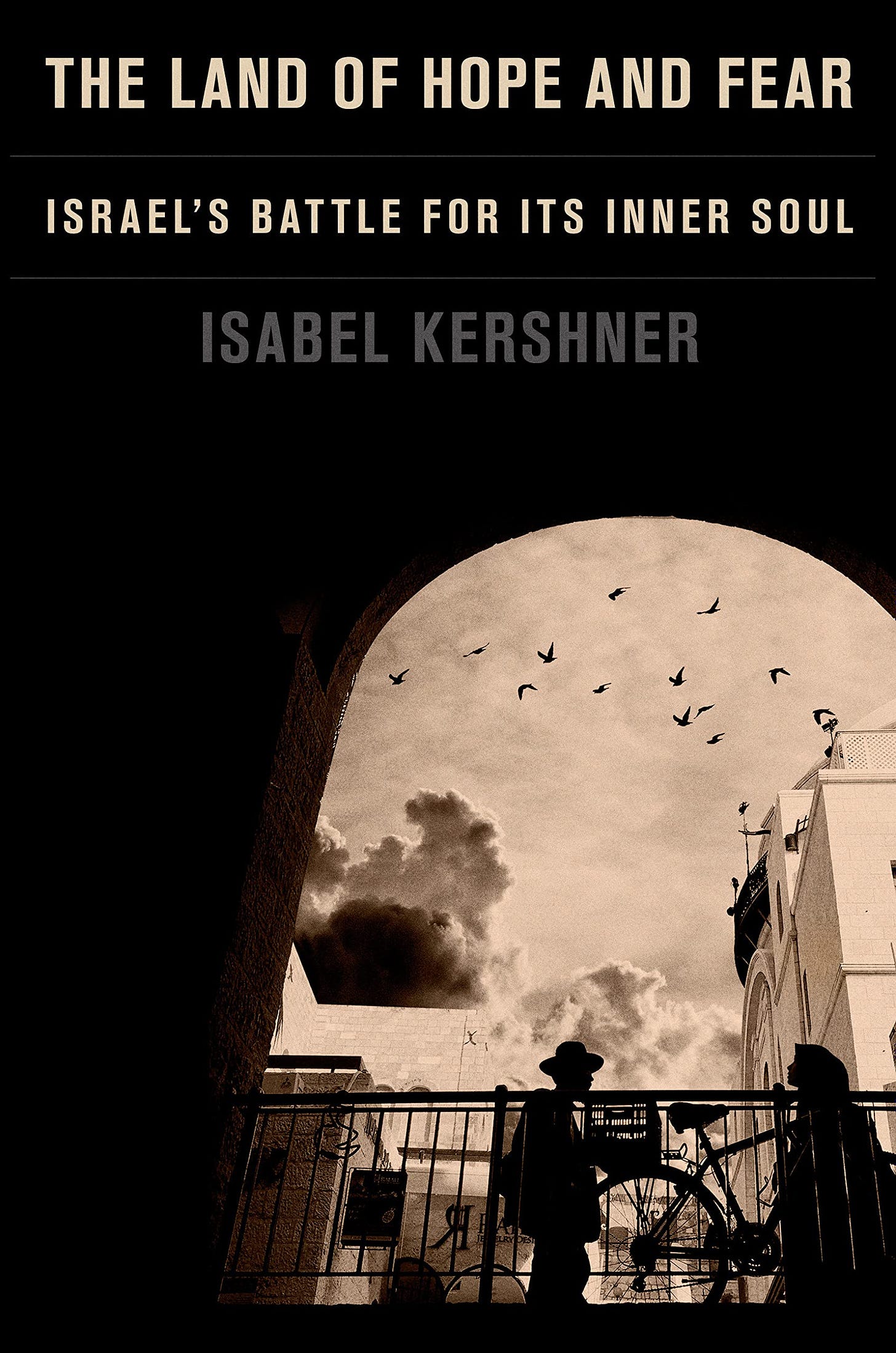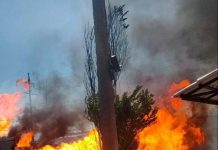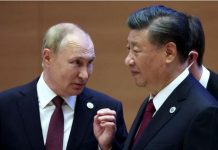A conversation with Isabel Kershner of the New York Times about her new book on Israel
Timing is everything, and Jerusalem-based New York Times correspondent Isabel Kershner certainly nailed that with her new book – an exploration of Israel’s internal rifts being published precisely as those rifts explode onto the international discourse.
The book, The Land of Hope and Fear, appears prescient because of the government’s attempted authoritarian overhaul, announced in January about a week after it took office, and the huge protest movement it spawned. The insightful and perceptive Manchester native, who moved to Israel in 1990, travels the country meeting all kinds of characters on the fault lines of its many divisions.
The riveting volume, a Publishers Weekly book of the week, comes out in the United States tomorrow.
I hosted Isabel this week on Ask Questions Later.
Congratulations on your book, The Land of Hope and Fear! Let me ask you about that contradiction. We see the narrative of a hyper-successful country that’s prosperous and increasingly accepted in the region, with the notion that Jews stick together to bravely fend off external threats – and the parallel reality of a country tearing itself to pieces because of a series of rifts over religion and more. In your book you use the word “unraveling” but also “midlife crisis,” which is overcomeable. Do you think it is? Can Israel survive?
Isabel Kershner: I have great faith in many of the people that I met on this journey. What came through for me very strongly was the incredible passion, engagement, and sense of belonging and identity of so many different groups here. It’s expressed in different ways; the identities differ. But everybody wants to be here. Rather than being apathetic … they’re really fighting over what the future of the country will look like. Of course, that’s a dangerous process. I don’t see people picking up guns and fighting each other in the foreseeable future – but ,,, it’s extremely concerning looking ahead as a country because you don’t really see how it all fits together in the end and how the economy, how modern Israel, the Israel of technical prowess and innovation and the mighty military which is so cutting edge, how that continues.
I haven’t seen in my own travels as a foreign correspondent too many places so riven by disagreements that are so fundamental. So part of me says a discourse is great. But on the other hand all this conflict makes for bad karma, does it not?
IK: It certainly does. Yes, argument is good, Jews have always argued. There’s the old joke of two Jews and three synagogues. But I think that while it’s fine to argue and everybody gets to express themselves and shout and vote for their own little boutique parties, nothing ever actually gets dealt with. These very fundamental problems at the core of these divisions, they’ve been festering for decades (and) never seem to be resolved or dealt with. And while you would think with generational change that some of these rifts would kind of fade … some morph into something else and become even more acute, as people look back and feel that they got screwed.
Well, the goalposts are constantly moving because of one very specific thing which almost dare not speak its name. Which is the Haredi birthrate. I think modern Israel looks a group that is a sixth of the country having almost seven kids per family and refusing to teach them a core curriculum of math, science and English, and depending on welfare, and with low attrition they could be the majority in a few decades. This is the source, I believe, of the angst and anger on the liberal “modern” side. So what do you do?
IK: Well, when we talk about trajectories … you’ve got your finger on the main one or one of the main ones: the birthrate is way above anything you see in any other OECD country in that sector. Now, the Haredim are part of Israel. Israel is as much theirs as anybody else’s. And if that’s the kind of country it’s going to end up being, you know, so be it. (But) if things continue as they are now, this has huge implications for the economy because (of) having generations of children not educated at all in basics of math, English and science, and not equipped for a modern workforce. It also has implications for the national security of the country (because the Haredim mostly don’t serve in the military – DP). But you have ever-broader margins of working Haredim (and) there has been a kind of Israelization, if you will, among the Haredi community as well, (becoming) an increasingly integral part of the country at the same time as trying to cloister the community from the outside evil influences. So you have these two opposing trends going on.
Meanwhile, their increasing involvement is dragging Israel away from liberal democracy towards authoritarianism, and maybe even theocracy. Which has led to increasing talk of cantonization, or federalization with strong levels of autonomy, and even partition. Because you could hive off the coast, essentially from Tel Aviv to Haifa, and it’s half the country, 80% liberal, 80% secular, a Judenstaat more or less in the vision of what Theodor Herzl envisioned. Except it’s probably indefensible because it has no strategic depth.
IK: It’s a fascinating debate. It’s really intriguing where maybe these ideological, social, and geographical divisions actually become hard borders. But it’s a crazy idea in a way, when you have a tiny country that you can drive from top to bottom in six hours. Once you start cantonizing it, you’d have a very wealthy prosperous liberal modern coastal plain and then a kind of failed state beside it.
Part of the reason we’re even talking about all this is the proposed “judicial reform.” Were you surprised the Netanyahu government ripped off its mask so totally one day in January, freaking out almost the entire productive sector of the country?
IK: The dizzying pace at which they were trying to push ahead with it was shocking for a lot of people. I think it tells you that despite this country being such a modern powerhouse (of) intelligence, counterterrorism, high-tech, etc., when it comes to the democracy, yes, it’s very fragile. People suddenly realize how fragile this can be and maybe this is a glimpse at what will inevitably be if demographically things continue along the same path.
I can see one way out of it, which is to decouple the right from the far right and the Haredim. Do they really want Putinization here? Theocracy? I think they like the prosperity. Maybe the result can be a new social compact that entrenches democracy.
IK: A lot of this is because of the situation Netanyahu is in as because of the trial, the center and left parties won’t sit in a government with him. He would have, I’m sure, preferred to form a government with them, but they won’t. And so as long as he’s there, his only option is to join forces with the most extreme right-wing elements we’ve ever had in government.
Let me ask something about you. You have a life here, while being a reporter. Does it help or hinder when you write about the internal conflict?
IK: Look, I’ve been here for more than 30 years. I brought up a family here and obviously I am therefore a stakeholder. I’m not a completely unfeeling neutral individual that doesn’t have any opinions on anything in my work. I think being more of an insider obviously helps inform my work and inform my reporting and writing and give it a kind of contextual depth that I wouldn’t have If I had just come in as a foreign correspondent two years ago. But at the same time I have to always be aware and I do strive to be fair. … Although in my regular reporting on this judicial overhaul story, it’s very hard. But the fun of writing a book is that you’re not limited to your 800 or 1,000 words and can really allow other people to express themselves and give them proper voice. But, you know, I’m not trying to be a totally uninvolved individual here. When somebody’s telling me something, I’m going to tell you what I think about what they’re saying.
So you gave yourself voice as well.
IK: Probably to a degree, but it’s not a polemic by any stretch.
It’s tricky. I think you did a great job. I noticed that fine line. I read it with some attention to that.
IK: I think we’ve been helped by the fact that even Yariv Levin, the justice minister himself, admitted in an interview that his first proposal was really not democratic. And if you listen to Alan Dershowitz as well, while he says it wouldn’t necessarily compromise democracy as such, it would affect “minority rights and civil liberties” … So then you’re like, well, isn’t that democracy? … If you didn’t signal to your readers that one of these sides is trying to protect liberal democracy and the other side isn’t, I think you’d be doing a disservice.
I will say that wherever you go in the world (and) ask people what is liberal democracy, they mostly say free elections and majority rule. Not guaranteed rights for minorities and protections and checks and balances and separation of the branches. It feels like a nice-to-have and a lot of people just don’t care about it. I’m grateful that in Israel at present it does appear to be that 60% still care, maybe 65%. So I kind of attach Israel’s miseries to something happening all over the world: a rear-guard action by liberal democracy to cement what had been thought already won but turns out to be the focus of a big and nasty fight. Do you think Israel is just part of that, or somehow different? Is it unique somehow?
IK: I think that Israel is affected by those trends abroad … and you see populist politics creeping in. It’s not like it was invented here, and yes, there are very different kinds of democracy. But I think there is a uniqueness here. First of all, when you examine the Israeli system and the fact that 75 years on we don’t have a constitution and we don’t have two houses (of parliament) and we don’t have any other check or balance other than the Supreme Court. And it is struggling with unique socioeconomic and security challenges. When you put these two things together, the trends coming from abroad plus Israel’s unique challenges, I think you have a perfect storm.
And not a tempest in a teapot! Thank you very much, Isabel.
IK: Thank you.

















